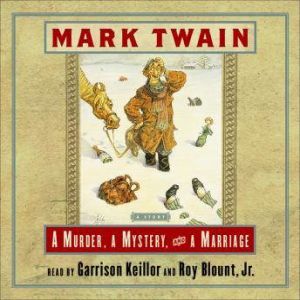

A Murder, a Mystery, and a Marriage
Author: Mark Twain
Narrator: Garrison Keillor
Unabridged: 2 hr 4 min
Format: Digital Audiobook Download
Publisher: Highbridge Audio
Published: 07/17/2001
Categories: Fiction, Literary Fiction


Author: Mark Twain
Narrator: Garrison Keillor
Unabridged: 2 hr 4 min
Format: Digital Audiobook Download
Publisher: Highbridge Audio
Published: 07/17/2001
Categories: Fiction, Literary Fiction
Mark Twain is the pseudonym of American writer and humorist Samuel Langhorne Clemens (1835-1910), whose best work is characterized by broad, often irreverent humor or biting social satire. Twain's writing is also known for realism of place and language, memorable characters, and hatred of hypocrisy and oppression.
Born in Florida, Missouri, Clemens moved with his family to Hannibal, Missouri, a port on the Mississippi River, when he was four years old. There he received a public school education. After the death of his father in 1847, Clemens was apprenticed to two Hannibal printers, and in 1851 he began setting type for and contributing sketches to his brother Orion's Hannibal Journal. Subsequently he worked as a printer in Keokuk, Iowa; New York City; Philadelphia, Pennsylvania; and other cities. Later, Clemens was a steamboat pilot on the Mississippi River until the American Civil War brought an end to travel on the river. In 1862 he became a reporter on the Territorial Enterprise in Virginia City, Nevada, and in 1863 he began signing his articles with the pseudonym Mark Twain, a Mississippi River phrase meaning "two fathoms deep."
In 1867 Twain lectured in New York City, and in the same year he visited Europe and Palestine. He wrote of these travels in The Innocents Abroad, a book exaggerating those aspects of European culture that impress American tourists. Much of Twain's best work was written in the 1870s and 1880s, when he was living in Hartford, Connecticut, or during the summers at Quarry Farm, near Elmira, New York. Roughing It recounts his early adventures as a miner and journalist; The Adventures of Tom Sawyer celebrates boyhood in a town on the Mississippi River; A Tramp Abroad describes a walking trip through the Black Forest of Germany and the Swiss Alps; Life on the Mississippi combines an autobiographical account of his experiences as a river pilot with a visit to the Mississippi nearly two decades after he left it; and A Connecticut Yankee in King Arthur's Court satirizes oppression in feudal England. The Adventures of Huckleberry Finn, the sequel to Tom Sawyer, is considered Twain's masterpiece.
Twain's work during the 1890s and the 1900s is marked by growing pessimism and bitterness. Significant works of this period are Pudd'nhead Wilson, a novel set in the South before the Civil War that criticizes racism by focusing on mistaken racial identities, and Personal Recollections of Joan of Arc, a sentimental biography.
In Twain's later years he wrote less, but he became a celebrity, frequently speaking out on public issues. He also came to be known for the white linen suit he always wore when making public appearances. Twain received an honorary doctorate from the University of Oxford in 1907. When he died he left an uncompleted autobiography, which was eventually edited by his secretary, Albert Bigelow Paine, and published in 1924.
Only 3/4 of the first CD (of the 2 CD set) actually contains the story (it is a short story). The second CD (and a bit of an introduction on the first CD) are devoted to background about the story as well as background about Mark Twain, including some quotes from his letters to fiends and family. Garrison Keillor does a great job of narrating the story, and Blount's narration of the background information is lively. Even though I was expecting just the story, I found both to be well-narrated and enjoyable.
Kendisi benim kütüphaneden ödünç alıp okuduğum ilk kitap olma özelliğini taşıyor. Ders arasında kitaplıkları turlarken keşfettim, zaten başkaca da karşıma çıkmazmış. 30 küsur sayfalık bir öykü üzerine yazılmış 40 küsur sayfa bir inceleme vardı kitabın sonunda. Hikayede pek bir iş olmadığı yetmezmiş gi......more
Molto carino, ma, ahimè, troppo breve. Ma a Mark Twain si perdona questo e altro :)......more
I read this story back when it appeared in the Atlantic Monthly (complete with illustrations from Peter de Seve.) When I saw the story in book form, I bought it, although I did not re-read it right away. I have to say that the Foreword and the Afterword by Roy Blount, Jr., add much to the story by g......more
Un po’ per volta il signor George Wayne - perché così sosteneva di chiamarsi - aveva rivelato il proprio segreto, in via strettamente confidenziale, ai vecchi del paese, e loro, in via strettamente confidenziale, avevano riportato i fatti agli amici più stretti, che li avevano subito estesi, in via......more